Two Private Hughs: White and Montgomery
ROMANIAN TRANSLATION OF THIS PAGE
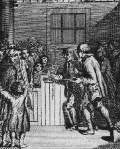
Two privates in the British 29th Regiment of Worcestershire named Hugh, Hugh White and Hugh Montgomery, played central roles in the tragic events on the night of March 5, 1770. This has been a cause for confusion: in one account of the Boston Massacre, Harry Hansen's The Boston Massacre: An Episode of Dissent and Violence, the two Hughs become one.
Hugh White
On March 5, 1770, Hugh White served as sentry on King Street. Some time after eight o'clock, White entered into an exchange with a wig-maker's apprentice, Edward Garrick, who was demanding payment from a British officer. The exchange escalated into violence, as White struck Garrick with his musket, knocking him to the the ground. Regardless of which version of the story is more accurate, it is undisputed that within minutes an unruly crowd of young men surrounded Montgomery and began hurling insults such as "Bloody lobster back!" at him. When the crowd swelled and he began being pelted with pieces of ice, Montgomery hurried to the Custom House, banged on the door and shouted, "Turn out, Main Guard!"
The eight-man guard finally emerged and marched to his rescue through a swelling crowd.
Hugh Montgomery
Private Hugh Montgomery was one of the eight soldiers in the main guard commanded by Captain Preston to march to the Custom House in an attempt to save Hugh White. After making their way to White, Montgomery and the other soldiers found themselves being surrounded by the mob. They formed a sort of semi-circle.
Soon, after a confusion of snowballs, ice chunks, and coal rained down on the British soldiers, someone shouted "fire" and five Americans were fatally wounded. Trial testimony never definitively answered the question of who shouted "fire" and who fired the fatal shots. In 1949, however, with the long-delayed publication of notes of Thomas Hutchinson, it was revealed that Montgomery admitted to his lawyers that it was he who started the Boston Massacre. Hit in the chest and knocked to the ground by a club wielded by one of the rioters, Montgomery responded, he said, by shouting "Damn you, fire!" Montgomery fired first, then the other soldiers followed.
Of the British soldiers tried in October 1770, the jury convicted only Montgomery and one other soldier, Matthew Killroy. Both were found guilty of manslaughter. Montgomery and Killroy pleaded "the privilege of clergy," a procedure that reduced their punishment from imprisonment to a branding on the right thumb.
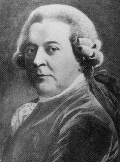
John Adams, in his old age, called his defense of British soldiers in 1770 "one of the most gallant, generous, manly, and disinterested actions of my whole life, and one of the best pieces of service I ever rendered my country." That's quite a statement, coming as it does from perhaps the most underappreciated great man in American history.
The day after British soldiers mortally wounded five Americans on a cobbled square in Boston, thirty-four-year-old Adams was visted in his office near the stairs of the Town Office by a Boston merchant , James Forest. "With tears streaming from his eyes" (according to the recollection of Adams), Forest asked Adams to defend the soldiers and their captain, Thomas Preston. Adams understood that taking the case would not only subject him to criticism, but might jeopardize his legal practice or even risk the safety of himself and his family. But Adams believed deeply that every person deserved a defense, and he took on the case without hesitation. For his efforts, he would receive the modest sum of eighteen guineas.
The Preston case came to trial in the Queen Street courthouse in October. Adams, and his young assistant, Josiah Quincy, defended Preston against a prosecution team comprised of Josiah's brother Samuel and Robert Paine. Adams succeeded in casting grave doubt as to whether Preston ever gave orders to shoot, and the Boston jury acquitted the captain.
More detailed records exist for the Soldiers' trial, which commenced on December 3. Adams presented evidence that blame for the tragedy lay both with the "mob" that gathered that March night and with England's highly unpopular policy of quartering troops in a city. Adams told the jury: "Soldiers quartered in a populous town will always occasion two mobs where they prevent one." He argued that the soldier who fired first acted only as one might expect anyone to act in such confused and potentially life-threatening conditions. "Do you expect that he should act like a stoic philosopher, lost in apathy?", Adams asked the jury. "Facts are stubborn things," he concluded, "and whatever may be our inclinations, or the dictums of our passions, they cannot alter the state of facts and evidence."
The jury acquitted six of the eight soldiers, while two (Montgomery and Killroy) were convicted of manslaughter and branded on their thumbs.
Initial reaction to Adams role in the case was hostile. His law practice dropped by over half. In the long run, however, the courageous actions of Adams only enhanced his growing reputation.
Adams would, of course, go on to lead a long and exemplary life that is chronicled in David McCullough's sympathetic new biography, John Adams. He would play a pivotal role in the Revolution, serve as George Washington's vice-president, and then become the nation's second president. As president, Adams appointed the great John Marshall as Chief Justice of the Supreme Court. He also most likely saved the Union, through his careful steering of a neutral course as war broke out between England and France. In the end, however, historian Sean Wilentz is probably accurate in his description of Adams as "a courageous and good man who fell out of touch with the country that he loved and that he served so diligently and often so well." Adams saw the goal of government as a counterbalancing of classes and never really seemed to understand that the Revolution had replaced his ancient notion with a new one based on popular sovereignty.
Adams died in Quincy, Massachusetts on the fiftieth anniversary of American independence, July 4, 1826.
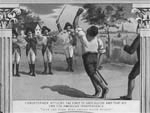
Some called Crispus Attucks (also known as Michael Johnson), a forty-seven-old mulatto, a "hero" and a "patriot"--"the first martyr of the American Revolution." Others, such as John Adams, lawyer for the British soldiers, saw Attucks as the rabble-rousing villain whose "mad behavior" as responsible for the carnage of March 5, 1770.
Attucks, believed to be the son of an African father and Natick Indian mother, was known around the lower docks 1770 as a hard man and a drifter. He resented the British presence in Boston. As a seaman on whaling voyages, he had worried about impressment into the British navy, while now as a part-time laborer he faced competition for work from British troops willing to do work during off-duty hours for lower wages.
On the evening of March 5, 1770, Attucks was in the front lines of a group of thirty to sixty Americans--described by John Adams as "a motley rabble of saucy boys, negroes and mullatoes, Irish teagues and outlandish jack tarrs"--taunting private Hugh White, the sentry stationed in front of the Custom House near King Street. After other British soldiers rushed to White's assistance, the crowd continued to hurl insults, pieces of ice, and sticks. According to eyewitness testimony, Attucks fanned the flames, calling the soldiers "Lobsters!" and telling the crowd that the soldiers dared not fire. Then, according to one witness, Attucks took hold of a bayonet" of one of the soldiers, Hugh Montgomery, knocking him down with a club (or "cord stick") in his other hand. This testimony was disputed by another witness, James Bailey, who placed Attucks fifteen feet from Montgomery at the time he was struck with a stick. The assault on Montgomery brought on a hail of fire from British muskets that left five Americans dead and a half-dozen others injured. Attucks was the first to fall, stuck twice in the chest by bullets.
In 1888, over objections of the Massachusetts Historical Society, which saw Attucks more as a villain than a hero, the Crispus Attucks Monument was dedicated on the Boston Common.
Acting Governor Thomas Hutchinson
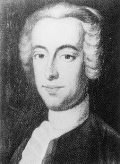
Boston-born Thomas Hutchinson was, at the time of the Massacre, Lieutenant Governor and Acting Governor of Massachusetts Province. A former Speaker of the Massachusetts House, Hutchinson was a man of substantial abilities. The fifty-nine-year-old Hutchinson had made a career of defending British perogatives against the democratic trend.
Word of the shooting reached Hutchinson in his home in North Square. He rushed to King Street, where he was confronted by an angry crowd demanding action. Hutchinson met with Captain Preston and, according to his account, asked: "Do you know, Sir, you have no power to fire on any body of the public collected together except you have a civil magistrate with you give orders?" After talking with Preston, Hutchinson proceeded upstairs in the Town House, where several members of the Council had already gathered. He assured Council members that he would do his best to see justice done, then he stepped out onto a balcony overlooking the scene of the massacre and asked the crowd for calm: "Let the law have its course. I will live and die by the law."
The next weeks were tough ones for Hutchinson. He faced demands from patriots for the removal of troops, to which he reluctantly agreed. Two weeks after the Massacre, Hutchinson wrote: "In matters of dispute between the King and the colonies government is at an end and in the hands of the people. Still, Hutchinson resisted demands for quick trials--"so that," he said, "people may have time to cool."
Hutchinson's support of British policies cost him dearly. During the Stamp Act riots, his home was ransacked and many of his belongings destroyed. On his watch as Governor in 1773, a band of Bostonians dumped tea into the harbor. Whatever hopes Hutchinson may have had for reasserting his control ended in 1773 with the publication of his confidential letters to British officials. After reading the letters while riding the judicial circuit, John Adams wrote of the Hutchinson letters: "The secrecy of these epistolary genii is very remarkable; profoundly secretive, dark and deep." Adams described Hutchinson as a "cool, thinking, deliberate villain, malicious and vindictive, as well as ambitious and avaricious." Hutchinson soon resigned, and departed for London.
Hutchinson wrote and published History of the Province of Massachusetts Bay, a book still consulted by historians. He died on English soil before the Revolution was over.

Captain Thomas Preston of the 29th Regiment was, according to his commanding officer, Lt. Col. Carr, "as cool and distinct as any officer of his rank in the service." On the moonlit night of March 5, 1770, Preston was officer of the day.
When a guard alerted Preston of a potentially life-threatening situation involving sentry Hugh White developing on King Street, Preston began pacing in front of the Main Guard, considering his not-very-good options. He paced for thirty minutes before yelling to his troops, "Turn out, damn your bloods, turn out!" Preston, in his redcoat with lace hat and drawn sword, followed his soldiers to the scene of the trouble. Although one witness had Preston barking orders such as "Support your arms! Prime and load!" along the way, this testimony was disputed by others.
After making their way to Hugh White, Preston and his men found the crowd began pressing in on them. Preston ordered the soldiers to line up in a semi-circle facing the taunting, snowball-throwing crowd. Preston stood behind them. Then someone--Private Montgomery as it turned out--yelled "Fire!" and the massacre began. (Later, several witnesses would falsely identify Preston as having given the "Fire!" order.) With soldiers reloading and nearly ready to began another round of fire, Preston shouted, "Stop firing! Do not fire!"
Sometime after midnight, Preston was arrested and brought to the Town House where he was interrogated for an hour about the shooting by two justices. At three o'clock in the morning, he was sent to the jail where he would remain for the next seven months.
Jail-cell writings of Preston appeared in the Boston Gazette. In an early letter to the paper, Preston extended his "thanks...to the inhabitants of this town--who throwing aside all party and prejudice, have with the utmost humanity and freedom stept forth advocates for truth, ind defense of my injured innocence." On June 25, however, a letter Preston sent to London found its way into Boston papers and undermined whatever goodwill he might have built up earlier. In his London letter, Preston complained about Bostonians who "have ever used all means in their power to weaken the regiments and to bring them into contempt, by promoting and aiding desertions, and by grossly and falsely promulgating untruths concerning them." He wrote that bitter "malcontents" were maliciously "using every method to fish out evidence to prove [the March 5 shooting] was a concerted scheme to murder the inhabitants."
Preston's trial, in which he was ably defended by John Adams, took place from October 24 to 30 in Boston. Although no transcript of his trial testimony survives, in his deposition Preston stated that he believed on the night of March 5 that the crowd would have murdered the sentry had he not ordered troops to his rescue. He also stated that he believed the ultimate goal of the mob to have been to "plunder the King's chest" at the nearby Custom House. Whether or not the jury believed all of Preston's story is not known, but they apparantly concluded that there was insufficient prove that he gave the order to fire: Preston was acquitted on all charges.
After his trial, Preston wrote: "I take the Liberty of wishing you joy at the complete victory obtained over the knaves and foolish villains of Boston." In December, Preston sailed for England, where he was awarded 200 pounds for his troubles.
Samuel Adams was, in Thomas Hutchinson's view, "the great incendiary." This combative patriot zealously guarded rights granted to the colonies and, in the words of John Adams (his second-cousin), "made it his constant rule" to "warn against the hostile designs of Great Britain."
At the time of the Massacre, forty-seven-year-old, Harvard-educated Adams served as recording clerk for the Massachusetts House and authored forceful letters to newspapers under assumed names--always pushing the democratic cause.
On March 6, 1770, the day after the shootings, Samuel Adams was chosen by a citizens group gathered in Faneuil Hall to chair a committee of fifteen that would petition Lt. Governor Thomas Hutchinson for the "immediate removal of troops" from the city of Boston. When Hutchinson suggested that he lacked the authority to order the removal of troops, Adams responded: "Sir, if the Lieuntenant Governor or Colonel Dalrymple, or both together, have the authority to remove one regiment, they have the authority to remove two, and nothing short of a total evacuation of the town, by all regular troops, will satisfy the public mind or preserve the peace." Adams wrote that as he made his demands to Hutchinson, "I thought I saw his face grow pale, and I enjoyed the sight." Adams would have his way: two British regiments (jokingly called "Sam Adams' two regiments") sailed from the city to Castle William.
Adams also busied himself--in today's jargon--with "spin control." He participated in writing A Short Narrative of the Horrid Massacre in Boston, a decidely slanted, anti-British account of the events of March 5. The goal of the publication was to refute charges that Bostonians were the aggressors in the incident and to build up public pressure against the British military. In letters to the Boston Gazette, Samuel Adams became the principal defender of Crispus Attucks, denying accounts that Attucks had attacked a soldier with a club. Wrote Adams, Attucks "had as good a right to carry a stick, even a bludgeon, as the soldier who shot him had to be armed with musket and ball."
The verdicts in the trials greatly disappointed Samuel Adams. In writings he criticized the verdicts, the conduct of the trial, and what he saw as a misuse of evidence. Adams complained of the British troops conduct on March 5: "They went down...armed with muskets and bayonets fixed, presuming they were clothed with as much authority by the law of the land as the posse comitatus of the country with the high sheriff at their head."
After the trials, Adams continued to be a thorn in the side of the British. He challenged the Quartering Acts and the appointment of customs commissioners. He organized a merchant boycott of imported goods and lent his support to the Boston Tea Party of December 16, 1773. In 1774, Adams became representative of Massachusetts to the Continental Congress. He signed the Declaration of Independence, and served as Governor of Massachusetts from 1794 to 1797.
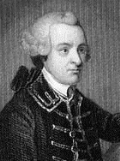
The origins of the unrest that led to the Boston Massacre can be traced to the arrival in Boston Harbor on May 9, 1768, of John Hancock's sloop, Liberty. The sloop carried a shipment of Madeira wine. Under British law, Hancock was obligated to pay customs duty on the wine, but instead the wine was unloaded and transported to Hancock's warehouse without the required payment. Customs officials ordered Liberty seized, leading to a public outcry--especially from Hancock. Defiance of customs officers by Hancock and others was the justification given for moving British troops into Boston in September 1768.
Hancock, like Samuel Adams, became a strong critic of the presence of British troops in Boston. He joined in the call for a convention in Boston, consisting of delegates from each of the towns in the province. The ostensible purpose of the convention was to discuss concerns about a possible war with France, but in actuality its purpose was to produce a petition to the King for a removal of troops.
At 11 o'clock on the day after the massacre, Hancock opened a meeting in Faneuil Hall that led to the call for the "instant removal" of British troops from the city. Hancock later served on a committee appointed to convey demands to Lt. Governor Hutchinson and Colonel Dalrymple.
On the fourth anniversary of the massacre, March 5, 1774, John Hancock delivered the most memorable oration of his career before "a vast crowd" and "rainy eyes." John Adams found the speech "elegant."
Hancock would, of course, two years later become a signer of the Declaration of Independence. His large and flowing signature inspired the use of his name in signing ceremonies of all sorts: "Put your 'John Hancock' right here."
